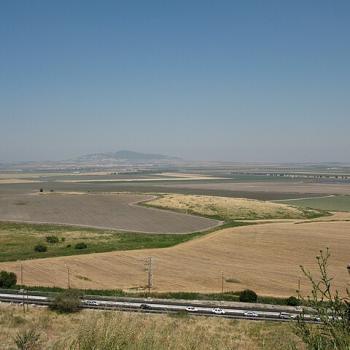Editors' Note: This article is part of the Patheos Public Square on Immigration and Refugees. Read other perspectives here.
Their names were Middle Eastern, African, Latino, and Chinese and hailed from forty-two countries, including Iraq and Afghanistan. Forty-nine immigrants gathered on June 15, 2016 in the Fairfax County Government Building to take the "Oath of Allegiance" and be sworn in as U.S. citizens.
They would declare out loud and in unison, bearing accents and dress from around the globe, that they would "support and defend the Constitution and laws of the United States of America against all enemies foreign and domestic, that I will bear faith and allegiance to the same…"
The quiet joy on the faces and in the hearts of each new citizen was palpable. Their names, as diverse as the world, were called out one by one, along with his or her native country. "Shout outs" and applause followed. It was as if we were collectively acknowledging the long road taken to reach this milestone.
"It means freedom and respect, and now no discrimination in my new country," Carmen Wyman told me.
Are these new citizens a threat or an opportunity? One's answer is often a predictor of political loyalty. Democrats see opportunity; Republicans see a threat. Is this good for the country? The polarization of parties makes it so and the immigration issue — particularly Muslim admissions — is the central vector of a fractious national debate.
Republican presidential candidate Donald Trump has proposed enacting a moratorium on all Muslims wishing to immigrate to the United States. (More recently, a moratorium from countries plagued by terrorism.) This is both bad policy and counterproductive to fighting the war on terrorism, creating the appearance of hate toward Muslims. Moisés Naím calls bad ideas "ideological necrophilia," worthy of being dead and buried (The Atlantic, February 24, 2016). But this idea is not dead yet, or buried, and Trump gets enormous support from evangelicals for proposing it.
The security issue is the worst slander. FBI records over the past fifteen years reveals that the terrorism threat to America is not from well-vetted refugees and immigrants. Rather, it's from homegrown terrorists (e.g., Timothy McVeigh who bombed the Oklahoma City federal building, killing hundreds) and handling the refugee crisis poorly, or failing to integrate immigrants into society. But in a world of "repetition compulsion" (Sigmund Freud), where demagogues repeat again and again the same false charges along with what are bone-headed solutions with negative outcomes, is it any wonder resentments are stoked and refugees regarded as threats?
As someone who has spent thirty years forging compromises (and passing a dozen religious freedom and human rights laws), let me clearly state what should be obvious: American political history, the moral principles of Christian faith, and the enormous contributions made by immigrants to America combine to make refugee admissions — even from war-torn Syria — a good and compassionate thing to do.
However, to expand the boundaries of our inclusion, and defend legal immigration, will require a greater degree of political vision, compassion, and bold determination. And neither the leaders of the Grand Old Party nor their followers in the pews of thousands of evangelical churches are ready to listen. But they will be, sooner or later.
That's because the vision for resettling refugees, immigration reform, and a vibrant, pluralism is a positive message. And we are still an optimistic nation. Immigrants and refugees coming to America are a strength — whether Muslim, Hindu, Sikh, or any other faith — because they fulfill the Founders' vision of a nation built on every race and creed living up to principles of religious freedom, first and foremost, as well as equality, and equal justice under law.
If we are to seek the Truth above everything else, then we shouldn't sell it cheap, to quote Roger Williams. We who are "new evangelicals" are principled pluralists, believing that neither our religion nor any other deserves a privileged place in law or politics. Moreover, we believe in covenanting together with other religions to protect not a naked (empty) or sacred (theocratic) public square but a civil public square characterized by civility.
A vision, however, without a strategy is a hallucination. We are commanded by our Lord to "love your neighbor as yourself" (Matthew 5:43). Our best strategy for debunking bigotry is to care more deeply. Not just talk about it, but also do it.




